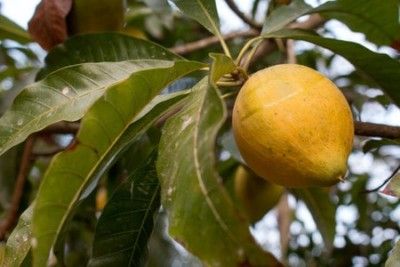Lucuma – the other healthy sweetness
A healthy diet is the goal of many people. How this works best depends on each individual. A good start is the reduction of fatty foods and refined sugar.
However, sweet foods and drinks still taste good, so healthier sweeteners are important as substitutes. For this a small, exotic fruit is becoming increasingly popular.
What is Lucuma?
In the original sense it is a 10 to 20 m high tree with the scientific name Pouteria lucuma. In the modern sense, specifically the fruit is called.
These are berries that are 10 cm in size, weigh about 1 kg, are almost completely round, and have a leathery, greenish-brownish-yellow skin. The fruit flesh is yellowish-orange respectively. golden-yellow, which is why the fruit is also called „Gold of the Incas“.
There are two varieties of the fruit. One has soft, creamy flesh and is processed locally into desserts. The other has some woody pulp, which is processed into the powder that you can buy from us.
Where grows lucuma?
The small tree grows in the Andes in South America. Its original distribution area is in the border area of the countries Ecuador, Peru and Chile, whereby the main distribution area is in Peru.
Since the demand for the powder is increasingly greater, plantations have now been established in Bolivia, Colombia and Costa Rica in Central America. Other growing areas are in Mexico, California and even Hawaii.
To thrive, the plant requires the climate of mountainous regions and grows at altitudes from 1000 to 2400 m, occasionally up to 3000 m. Peru is the main producer, accounting for almost 88% of world demand. Almost all of the remaining 12% comes from Chile.
What it can be used for?
Fresh fruit of the soft variety is exclusively processed locally. It is used to make desserts and drinks or added for taste.
The taste is often compared to maple syrup, sweet potato or caramel, although the unprocessed fruit leaves an unpleasant aftertaste.
The hard variety is dried, processed into powder and thus exported for the world market. The powder is high in calories (approx. 370 kcal / 100 g) and contains iron, magnesium, zinc, phosphorus, potassium, calcium and beta-carotene in larger amounts.
For vegetarians and vegans, the high content of B vitamins, especially vitamin B3, which is very unusual for plants, is important.
Applications in the health sector
The fruit and the powder are said to have various health-promoting effects. Above all, the powder is suitable as a less precarious sweetener for diabetics, since the glycemic index is very low at 7.
Also persons with a gluten incompatibility profit from it. Otherwise, the high vitamin B3 content can compensate for vegetarian and vegan malnutrition.
In addition to positive effects for certain diets, lucuma can also have a positive effect on the skin and digestion. A 2009 study suggests a blood pressure lowering effect.
Effect
Lucuma contains antioxidants and in particular the oil is said to have anti-inflammatory effects on the skin. The healing of wounds can also be improved with it, which could be shown quite plausibly in first medical studies.
Beta-carotenes are converted to vitamin A in the body and can slow down aging processes of the skin. Easily digestible fiber can promote digestion.
In addition, they swell easily in the stomach and have a satiating effect. Thus, the fruit can be suitable to some extent for various diets, such as the GLYX diet.
Side effects
Specific side effects of lucuma are not known so far and a maximum daily amount of 100 g powder is generally recommended. However, as with all foods, intolerances and allergic reactions may occur.
Therefore, you should always start with a small amount for trial first. If you notice problems, then at least a consultation with a doctor is appropriate. Also in pregnancy the intake should be clarified first.
Even though the powder is specifically recommended as an alternative sweetener for diabetics, it contains about 84 g of carbohydrates per 100 g. A clarification with the doctor is mandatory for diabetics in any case.
How to buy
Due to the increasing popularity of lucuma powder, the number of producers and suppliers is also increasing significantly. While this creates healthy competition, it also increases the likelihood that there are black sheep among them.
Thus, there is a possibility that the powder is stretched with other ingredients or contaminated with pesticides and other harmful chemicals.
Therefore, buy only pure powder from known and trusted sources. Good indications of high quality are various seals of approval.
Especially organic seals guarantee that the powder is free of pesticides and other chemicals, which you should not have in your food.
